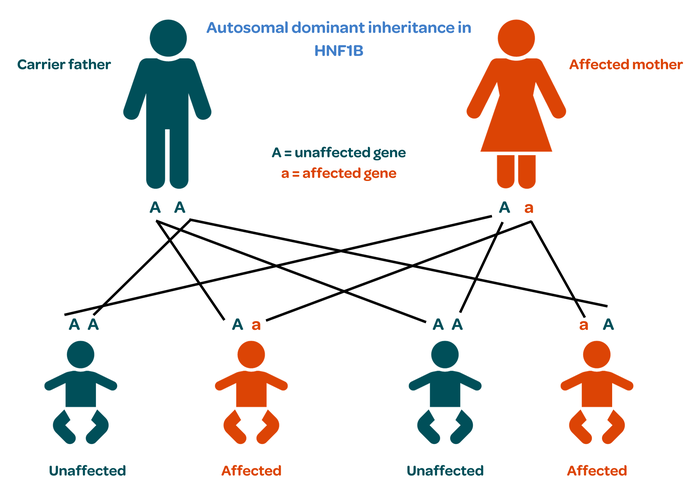What is Hepatocyte Nuclear Factor-1 Beta (HNF1B)?
Hepatocyte Nuclear Factor-1 Beta (HNF1B; usually pronounced ‘HNF1 Beta’) is a rare genetic condition caused by changes in the HNF1B gene. This gene is involved in the development of several organs including the kidneys, urinary tract, pancreas and liver, which can all be affected by the condition.
HNF1B affects around 1 in 10,000 adults and 1 in 23,000 children in the UK.
What are the signs and symptoms of HNF1B?
HNF1B is also known as renal cysts and diabetes (RCAD) syndrome as these are the two main symptoms of the condition. It is also classed as a subtype of a condition called Autosomal dominant tubulointerstitial kidney disease (ADTKD).
Cysts can develop in the tiny tubes (tubules) of the kidneys. The cysts are not cancerous. For some people, the cysts do not cause any problems and there is no effect on the function of the kidneys. For other people, the cysts can cause severe damage, which can eventually lead to kidney failure in rare cases.
Some people with HNF1B are born with just one kidney. This may never cause any problems but may require monitoring to make sure the function of that kidney is not affected.
Most people with HNF1B also develop diabetes. This can occur at any age but is usually first diagnosed in teenagers or young adults. Sometimes it starts during pregnancy. People with HNF1B may have a small pancreas so it cannot make enough insulin. Insulin produces chemicals called enzymes that help to digest food. Without enough insulin, people may develop diarrhoea and weight loss.
Other symptoms of HNF1B include stomach cramps due to low levels of magnesium and gout (a form of arthritis).
Some people are missing a whole copy of the HNF1B gene rather than having a damaged version. In these cases, there is an increased chance of being diagnosed with an autism spectrum disorder, although the reason for this is not yet known.
What causes HNF1B?
The HNF1B gene acts like a switch to turn other genes on and off. When it doesn’t work properly, the development of several organs including the kidneys, urinary tract, pancreas and liver is affected. This does not necessarily cause any problems, as the organs can continue to work normally even though their structure is abnormal.
How is HNF1B diagnosed?
HNF1B can be hard to diagnose as there is a lot of variation in how the condition presents.
Blood tests can be used to diagnosis diabetes and a scan may show that the pancreas is too small to produce enough insulin.
An ultrasound scan may show cysts on the kidneys.
Genetic testing can confirm the diagnosis.
Does HNF1B affect other parts of the body?
Women with HNF1B may have abnormalities in their reproductive organs, including a different sized or shaped uterus than normal. This can be seen on an ultrasound scan and may cause problems with fertility.
Men may develop cysts on the back of the testicles. These are usually painless, do not affect fertility and do not require treatment, although it is recommended to get any growths checked by a doctor.
HNF1B can also cause problems with the functioning of the liver. This can be seen on an ultrasound scan or diagnosed by a blood test. However, it rarely causes any symptoms and severe liver disease is very unlikely to develop.
HNF1B can also cause maturity-onset diabetes of the young (MODY), which occurs without kidney disease.
Does HNF1B run in families?
HNF1B can run in families, or it may occur as a new mutation with no family history. Sometimes other family members may not realise that they also have the condition as its effects can be so mild and variable. For example, a parent may pass on a copy of the affected gene to their child without ever showing any signs of having the condition themselves. The reason for such a variation in the severity of symptoms is currently unknown.
HNF1B is inherited from one generation to the next in a pattern known as autosomal dominant inheritance.
Everybody has two copies of the HNF1B gene, one from each parent.
One copy of the faulty gene is enough to cause the condition.
There is therefore a one in two chance that a child born to an affected person will receive the abnormal gene and eventually develop HNF1B themselves.
Genetic counselling may be offered depending on family history.

How is HNF1B treated?
Most people with HNF1B do not need any kidney-specific treatment. Kidney function and blood pressure will be checked regularly to make sure that everything remains stable.
Insulin injections may be prescribed to treat diabetes.
Medication such as allopurinol may also be prescribed to reduce the levels of uric acid in the blood to prevent developing gout.
Magnesium supplements may be prescribed to treat cramps.
Genetic counselling may be offered for women with HNF1B who would like to become pregnant.
Where can I get more information or support about HNF1B?
We are not aware of any UK-based support groups for HNF1B. If you know of any HNF1B disease patient groups, please let us know so we can share their details.

Publication date: 11/2023
Review date: 11/2026
This resource was produced according to PIF TICK standards. PIF TICK is the UK’s only assessed quality mark for print and online health and care information. Kidney Care UK is PIF TICK accredited.